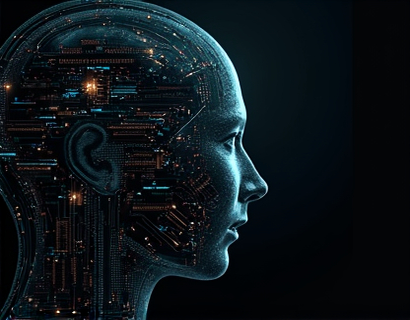Elevating User Engagement in the Digital Age: The Synergy of Crypto and AI
The intersection of cryptocurrency and artificial intelligence (AI) is creating unprecedented opportunities to enhance user engagement in the digital realm. As technology continues to advance, the fusion of these two revolutionary fields is redefining how users interact with digital platforms, applications, and services. This article delves into the latest advancements in this space, offering valuable insights and strategies for tech enthusiasts to stay ahead in the rapidly evolving digital landscape.
The integration of AI into cryptocurrency has given rise to a new generation of smart, adaptive, and secure financial systems. These systems leverage AI algorithms to analyze vast amounts of data, predict market trends, and automate trading processes. For users, this means a more personalized and efficient experience when engaging with digital currencies. AI-driven platforms can tailor recommendations based on individual user behavior, preferences, and risk tolerance, thereby increasing user satisfaction and engagement.
Personalized User Experiences
One of the most significant benefits of combining AI with cryptocurrency is the ability to deliver highly personalized user experiences. Traditional financial systems often treat users as a homogeneous group, offering generic services and recommendations. In contrast, AI-powered platforms can analyze user data to create customized experiences. For instance, a digital wallet app can use machine learning to suggest optimal investment strategies, monitor portfolio performance, and alert users to potential risks.
Moreover, AI can enhance user interfaces by adapting to individual preferences. For example, a cryptocurrency exchange can use AI to adjust the layout, features, and even the language of its interface based on the user's behavior and feedback. This level of personalization not only improves user satisfaction but also encourages longer engagement with the platform.
Enhanced Security Measures
Security is a paramount concern in the world of cryptocurrency. AI technologies are playing a crucial role in bolstering the security of digital assets and user data. Machine learning algorithms can detect and prevent fraudulent activities by identifying patterns and anomalies in user behavior. For instance, AI can monitor transaction patterns and flag suspicious activities in real-time, providing an additional layer of protection against cyber threats.
Furthermore, AI can enhance the security of private keys and wallet management. Advanced biometric authentication methods, such as facial recognition and voice recognition, powered by AI, offer a more secure and convenient way for users to access their digital assets. This not only reduces the risk of unauthorized access but also simplifies the user experience, making it more engaging and trustworthy.
Smart Contracts and Automated Processes
Smart contracts, self-executing contracts with the terms directly written into code, are another area where AI and cryptocurrency intersect to enhance user engagement. AI can optimize the creation and execution of smart contracts by analyzing complex data sets and predicting outcomes. This ensures that contracts are executed efficiently and accurately, reducing the need for intermediaries and lowering transaction costs.
Automated processes driven by AI can also streamline various user interactions. For example, AI can automate the process of rebalancing investment portfolios, executing trades, and managing risk. Users can set specific parameters, and AI will handle the rest, providing a seamless and hands-off experience. This automation not only saves time but also reduces the potential for human error, making the overall experience more reliable and engaging.
Predictive Analytics and Insights
AI-driven predictive analytics is revolutionizing how users gain insights into the cryptocurrency market. By analyzing historical data, market trends, and real-time information, AI can provide accurate predictions about future price movements and market conditions. This enables users to make informed decisions, potentially leading to better investment outcomes.
Additionally, AI can offer in-depth market analysis and sentiment analysis, helping users understand the underlying factors driving market trends. For instance, natural language processing (NLP) can analyze news articles, social media posts, and other textual data to gauge public sentiment towards specific cryptocurrencies. This information can be invaluable for users looking to stay ahead of the curve and make strategic decisions.
Community Engagement and Decentralized Governance
The decentralized nature of cryptocurrency platforms opens up new possibilities for user engagement through community-driven governance. AI can facilitate more effective and inclusive decision-making processes by analyzing community feedback, identifying key issues, and proposing solutions. For example, AI can help organize and prioritize community proposals, ensuring that the most relevant and supported ideas are addressed first.
Moreover, AI can enhance transparency and trust within the community by providing real-time updates and insights into governance processes. Blockchain-based voting systems powered by AI can ensure that votes are counted accurately and securely, giving users a greater sense of ownership and involvement in the platform's development.
User Education and Support
Educating users about cryptocurrency and AI technologies is essential for fostering engagement and adoption. AI-powered chatbots and virtual assistants can provide personalized guidance and support, answering common questions and offering tailored resources. These AI-driven tools can adapt to the user's level of knowledge, providing beginner-friendly explanations for newcomers and more advanced information for experienced users.
Interactive learning platforms powered by AI can also enhance user education. For instance, AI can create personalized learning paths based on the user's interests and progress, offering a more engaging and effective learning experience. This not only helps users understand the technology better but also builds confidence in using these tools, leading to increased engagement.
Challenges and Considerations
While the integration of AI and cryptocurrency offers numerous benefits, there are also challenges and considerations to keep in mind. One major concern is the regulatory landscape, which is still evolving in many regions. AI-driven financial systems must comply with local and international regulations, which can vary significantly. Staying informed about regulatory changes and ensuring compliance is crucial for maintaining user trust and avoiding legal issues.
Another challenge is the potential for AI biases and errors. AI algorithms are only as good as the data they are trained on, and biased or incomplete data can lead to inaccurate predictions and decisions. It is essential for developers to implement robust data validation and testing processes to minimize these risks. Transparency in how AI systems make decisions can also help build user trust and confidence.
Future Trends and Opportunities
The future of AI and cryptocurrency is promising, with several emerging trends and opportunities on the horizon. One such trend is the development of decentralized AI models, where AI training and inference are conducted on a decentralized network. This approach can enhance privacy, reduce central points of failure, and make AI more accessible to a broader range of users.
Another exciting development is the integration of AI with other emerging technologies, such as blockchain, Internet of Things (IoT), and 5G. These synergies can lead to innovative applications in areas like smart cities, healthcare, and supply chain management, further expanding the potential user base and engagement opportunities.
As the technology matures, we can expect to see more sophisticated AI-driven features and services in the cryptocurrency space. From advanced fraud detection systems to more intuitive user interfaces, the possibilities are vast. For tech enthusiasts and users alike, staying informed and adaptable will be key to harnessing these advancements and maximizing digital engagement.











































